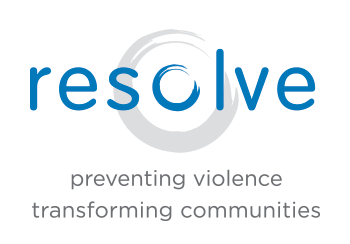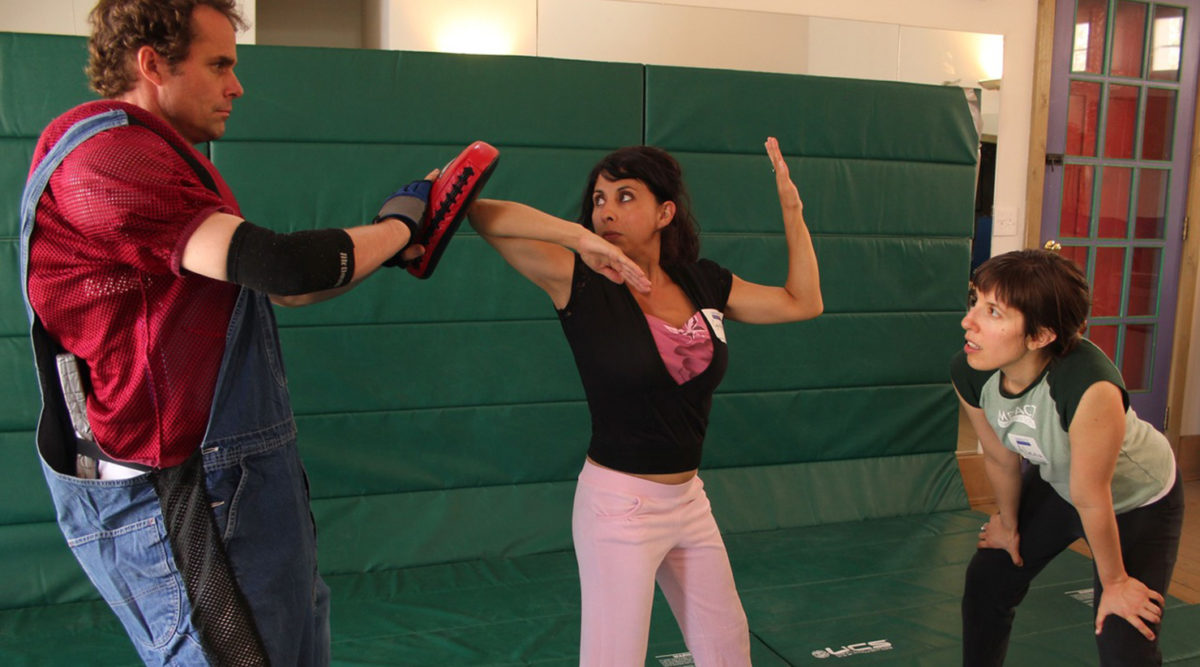In experiential self-defense classes, students practice verbal and/or boundary setting and self-defense skills through dynamic, interactive scenarios in an emotionally supportive environment. Our classes are co-taught by trained instructors: Whistle Instructors lead the class, teaching drills and coaching students through scenarios, while Suited Instructors create simulations of stressful or threatening scenarios, enabling students to respond quickly and appropriately while in the adrenaline state and to incorporate skills into muscle memory. Many of our graduates describe a “ripple effect” through their lives after Resolve; they often report increased self-esteem and self-confidence, improved leadership skills and greater calm and focus during stressful situations.
Experiential classes generally serve up to 16 students and can take place at Resolve’s studio or another location more convenient for your group. Classes can be single-gender or mixed gender. Sometimes groups are formed based on age-affinity like groups of teens or elders. Resolve also serves groups of individuals of similar abilities such as wheelchair users or those with developmental disabilities.
Resolve is able to customize our standard workshops to meet your particular group’s needs. Our courses can be adapted to range in length from 2-20 hours for 1-16 students. Based on your input, we can tailor role-playing scenarios to simulate participants’ actual experiences, allowing individuals to practice appropriate responses to dangerous or stressful situations in a controlled environment.

Class Descriptions
In our 4-Hour Introductory Workshop, participants practice verbal and physical strategies in face-to-face scenarios to avoid or stop assault. The curriculum also includes practicing verbal boundary setting skills with people we know and de-escalating conflicts.
In this class, students learn to:
- Recognize when your boundaries are being crossed
- Respond effectively to offensive, inappropriate, and dangerous behavior
- De-escalate conflicts
- Defend yourself when faced with physical violence
- Set boundaries with people you know
The 20-Hour Basics Course includes everything and addresses everything the average person should need to know to stay safe. In this course, students will learn to:
- Avoid potentially dangerous situations (awareness and avoidance skills)
- Recognize when your boundaries are being crossed (interpersonal awareness)
- De-escalate conflicts (verbal dissuasion techniques)
- Defend yourself when faced with physical violence (physical self-defense)
- Set boundaries with people you know (communication skills)
In addition to the verbal and physical skills taught in the 4-Hour Workshop, participants practice defending themselves in the following in Basics: physical skills for scenarios in which someone is grabbed from behind (or “jumped”), grabbed from behind and brought or thrown to the ground, and an assault that starts off on the ground or in a bed.
20-Hour graduates report feeling:
- Peace of mind from having practical and effective skills to defend themselves
- Greater self-confidence and self-worth
- A sense of freedom to use their voices, pursue their dreams, and reach their potential
In our 5-Hour Courageous & College-Bound class, girls and women ages 15-21 learn verbal and physical skills to help them feel safe and confident when they go to college, travel, and live their day-to-day lives. In this class, students will learn to:
- Avoid potentially dangerous situations (awareness and avoidance skills)
- Recognize & respond when their boundaries are being crossed (interpersonal awareness & communication)
- Talk their way out of an assault (verbal dissuasion techniques)
- Defend themselves when faced with physical violence (physical self-defense)
Topics & scenarios will address dating, parties, friendships, travel and setting boundaries with people they don’t know. (This class can be adapted for mixed gender settings.)
In our Verbal Workshops (2-4 hours), students learn to set boundaries and stand up for themselves while maintaining their personal or professional relationships. Everything is practiced in realistic role-play with in-the-moment feedback. Students practice communication skills including approachable body language, verbal skills to set effective boundaries, and use humanizing, empathizing, de-escalating techniques. The scenarios are adapted per group.
In our Children’s Safety Workshop (6 hours), children ages 6-12 learn concepts of safety by practicing and role-playing scenarios. This fun class emphasizes concepts about:
- Avoiding dangerous situations
- Using intuition
- Staying safe with strangers
- Stopping unwanted touch & boundary-setting
- How to deal with bullying
- Verbal & physical tools to end assault and get to safety
In our 16-Hour Advanced Basics Course, we answer students’ “What If?” questions, and continue to learn communication skills for people we know, refine physical skills and learn new techniques, increase adrenaline management in a variety of situations, and bond with other Resolve graduates.
Participants learn to:
- Use complex communication skills, dealing with people we know
- Judge what your role is as a bystander in violent situations
- Protect loved ones
- Defend yourself in a bed with sheets
- Defend yourself barefoot
- Defend yourself in an enclosed space, like an elevator
- Utilize your other senses to defend yourself when blindfolded
- Improve your adrenaline management
Advanced Basics is open to graduates of the 20-hour Basics Course, and requires instructor approval.
Defense Against the Armed Assailant Class
The most common questions students ask involve handling an armed assailant. Knives and guns are powerful tools of control and add an additional level of risk and fear to any situation. Learn the fundamentals for dealing with confrontations involving an armed assailant. The class de-mystifies the threat of weapons and those who use them. The limitations and range of danger are covered for each weapon.
Participants learn to:
- Control the weapon
- Quickly and decisively cause pain to the attacker
- Continually main control of the weapon while fighting back
- Safely handle the weapon after the fight is over
This advanced course is open to graduates of Advanced Basics, and requires instructor approval.

